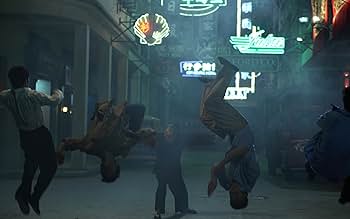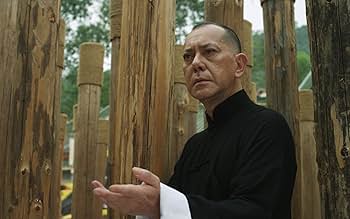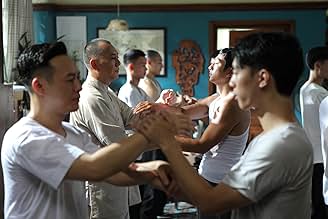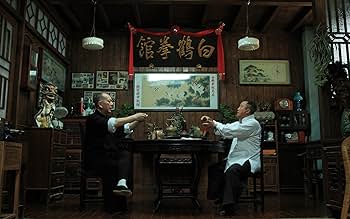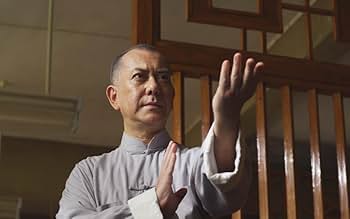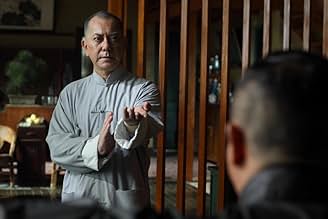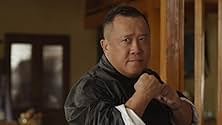In postwar Hong Kong, legendary Wing Chun grandmaster Ip Man is reluctantly called into action once more, when what begin as simple challenges from rival kung fu styles soon draw him into th... Read allIn postwar Hong Kong, legendary Wing Chun grandmaster Ip Man is reluctantly called into action once more, when what begin as simple challenges from rival kung fu styles soon draw him into the dark and dangerous underworld of the Triads. Now, to defend life and honor, he has no ch... Read allIn postwar Hong Kong, legendary Wing Chun grandmaster Ip Man is reluctantly called into action once more, when what begin as simple challenges from rival kung fu styles soon draw him into the dark and dangerous underworld of the Triads. Now, to defend life and honor, he has no choice but to fight one last time ...
- Awards
- 4 wins & 7 nominations total
- Jenny
- (as Zhou Chuchu)
- Local Dragon
- (as Xin Xin Xiong)
- Ngai Tong
- (as Jonathan Wong)
- Director
- Writer
- All cast & crew
- Production, box office & more at IMDbPro
Featured reviews
The movie isn't going to be spectacular as Ip Man or Ip Man 2. You already know it from the cast. But it was good in its own ways because Anthony Wong's portrayal of the master was kind of spot on. Life in Hong Kong wasn't so easy in the '50s or '60s, and being an old man in that environment would have been hard even for a grand master of his caliber. The story integrates both Ip Man and Hong Kong pretty well. If there's a problem with this movie, story didn't flow as smoothly as it could have been, but finding story in Ip Man's old age probably wasn't so easy.
I would accept this movie as Ip Man 3. I don't know how good the real Ip Man 3 is going to be, but without Donnie Yen in the starring role, I'm sure it wouldn't have the high tension previous two movies had. As many have commented, this rush to capitalize on the Ip Man's popularity is getting to be passé. This movie was acceptable as the swan song to the saga of Ip Man.
Set against the big commercial movie cog machine and the Ip Man franchise, the majority of Yau-Wong penchant for grittiness is diluted and only some of it remains in Ip Man: The Final Fight. It is that essence of the grittier and the uglier sides of Ip Man that makes out for the more interesting parts in Ip Man: The Final Fight, but it's also the film's major weakness because it never treads far enough from familiar territory.
What the film ends up being more like tonally is a combination of the Wilson Yip- Donnie Yen Ip Man films and Bruce Lee My Brother, where it is loosely glossing over the details of the grandmaster's life and dramatically punching up the action so it can allow for fight scenes, but also providing a retro-gaze of Hong Kong accompanied with a celebrity guest-list cameos.
For example, it's been said that Ip Man sported an opium habit. The concept is telegraphed but never truly explored. Another example is Hong Kong actor Liu Kai Chi gives a cameo as Ip Man's friend who is suffering from poverty. They start what might be a potentially interesting storyline but it never finishes itself. Much of the film is like that.
There are about several subplots running through the story and they all end up as separate vignettes that do not rise above the sum of it's parts. For a biopic drama, that's a problem because it does not provide an unified narrative goal. This is not an editing issue. The story was based on Ip Chun's stories of his father and it is as if seemed like the screenwriter noted them down as told and the director literally shot them that way. So I attribute this issue to lazy writing. The retroactive voice-over device ends up killing a lot of the drama. The scene will be happening and the voice-over will cut in summing up the rest of the scene in past tense. It keeps glossing over by stating what happened instead of letting the audience experience what's happening in the now.
Anthony Wong is very natural as Ip Man. He looks most like the real-life version of Ip Man and actually adopts a Foshan accent. He breathes many colors into the role and the scenes with Ip Man and his students is the heart of the film. Anthony Wong is pretty much the best thing about this movie and his performance alone is the price of admission.
Eric Tsang has a great supporting role as a Crane style master who befriends Ip Man. There is a self-referential joke where Tsang says being a 'clan master' (獎門人) is difficult, a reference to his famous television game show, that was self-serving and unnecessary. Tsang and Wong share an awesome fight together. Not a lot of people remember that Eric Tsang started out as a stuntman; the fight looks very authentic. They were really smashing their forearms together. Eric Tsang is a badass.
Something I noticed about the cinematography was there were way too many crane shots in this film. There's a scene that ends on a connective moment between two characters and then it cuts to a crane shot backing away presenting a view of the entire rooftop set. I have a theory about this. In Hong Kong, booking a crane from a production house is a planned expense and usually you would require more crew members or more time to set up a crane shot. Production houses in the Mainland will give crews an entire film equipment package in their deals, which includes cranes and jibs. With the cheap labor and higher amount of crew members, a crane shot can be set up much faster in the Mainland. As a recent occurrence, a lot of Chinese productions lead by Hong Kong directors have recently been very crane shot-heavy. Hong Kong directors, this needs to stop. You have to remember to pull back every once and a while.
Just as a small footnote, I really hated the Bruce Lee cameo. Playing Bruce Lee in a film is by no means an easy feat but the actor they chose was abysmally awful. He made Bruce Lee look like a rich asshole sellout. It was not fun, nor did it work as a pop culture reference.
Overall, I enjoyed this film, but I do not think it works completely as a standalone piece. It seems to fit as the final piece to this whole line of Ip Man films. In a way, I can't help it because they've made so many movies about Ip Man in such a short time.
With every film, I see a little more of who this man was, what his legacy was and it had me thinking about even what being a good teacher means. I still think The Grandmaster is the best Ip Man film. They really don't need to make any more Ip Man movies. And if they do (and I think they are because I saw a poster for an Ip Man 3 with Donnie Yen), please do the story with Bruce Lee and get him right.
For more reviews, please visit my blog at http://hkauteur.wordpress.com/
Like Donnie Yen's 'Ip Man 2', this one begins in 1949 as Ip Man (Anthony Wong) arrives in Hong Kong from Foshan to settle into a humble room on the roof of a three-storey shophouse. Thanks to a chance encounter with martial arts enthusiast Leung Sheung (Timmy Hung, better known as son of Sammo Hung), Ip gains a small following of working-class individuals to start a makeshift Wing Chun school without needing to go against his nature to advertise his craft.
It might seem like a motley crew – including a policeman (Jordan Chan), a seamstress and union activist (Jiang Luxia), a waitress at a dim-sum restaurant (Gillian Chung), a prison officer (Marvel Chow) and a tram driver – but there's no denying their passion to learn, and at least at the start, how close-knit a group they make. Yet the circumstances then don't make it any easier for Ip nor for his students, and it is from casting the fates of Ip and his disciples against a constantly evolving but always tumultuous Hong Kong in the 1950s to 1970s that Yau's film truly comes alive.
Similarities to Alex Law's 'Echoes of the Rainbow' are not unjustified, since Yau clearly evokes the same sense of nostalgia for the period during which the former was also set. Expertly weaving several disparate themes, screenwriter Erica Li deftly paints a vivid picture of a colony rocked by tensions between the unions and their companies, infighting between the various martial arts schools, corruption of the local police and most importantly, the struggle of ordinary folk to make ends meet and provide for their family.
Li draws on these real-life historical contexts to delineate the fates of Ip and his disciples, in particular that of Tang Sing (Chan) and Wong Tung (Chow). Among the disciples, Tang Sing's character is the most fully-fleshed, depicted as a good man caught in a moral crisis between following his conscience (as Ip advises) and the temptations of power and money in his position of authority. Tang's choice to side with the infamous kingpin named Dragon (Xiong Xin Xin) behind many of the illegal activities taking place inside the notorious Kowloon Walled City inevitably entwines Wong Tung, and by extension the entire Ip Man clan that culminates in the titular showdown.
That finale is but one of four thrilling action setpieces, and easily the most gripping and exhilarating one. First within the confines of an illegal boxing ring in a warehouse and then along the exterior windswept alley battered by the onslaught of an imminent typhoon, action choreographers Li Chung Chi and Checkley Sin let the climactic fight between Ip Man and Dragon play out – the joy here not solely being from seeing veteran martial arts actor Xiong Xin Xin show off his impressive moves, but also from how Anthony Wong's one-year training in Wing Chun has truly paid off. Of course, that is also apparent from the earlier sequences, in particular one in which Ip Man squares off in a friendly closed-door bout with rival 'White Crane' master Ng Chun (comedian Eric Tsang in a fantastic cameo that shows off his agility quite certainly honed from his former days as a stuntman).
Besides demonstrating a facet of Anthony Wong's acting repertoire that is rarely seen (fun fact – the man is a dedicated practitioner of the 'Monkey Fist' style), this portrayal of Ip Man also benefits from the dramatic skills of arguably one of the best actors in Hong Kong cinema today. While Tony Leung's was just like any other of his from other Wong Kar Wai collaborations and Donnie Yen's was probably more stagey than who Ip Man was in real life, Wong's depiction is – we dare say – the most nuanced that captures both the man's humble dispositions and his internal struggles.
The latter is also thanks to a multi-layered script that doesn't just dwell on the aspects of Ip Man's life that pertain to his martial artistry, but also his personal life in relation to his wife Yong Cheng (Anita Yuen) and his son (Mainland actor Zhang Song Wen). The first Ip Man film so far to pay due attention to what must have been one of his greatest regrets spending the large part of his postwar years apart from wife and son, it just as poignantly reveals his gentle affection for a Shanghainese songstress Jenny (Zhou Chuchu) - despite the veiled objections of his students - that again finds closure in death. Wong is absolutely brilliant in these intimate moments of Ip Man's life, and it's hard to imagine a more befitting actor here to play the role.
In choosing to illuminate the less ostentatious but more relatable characteristics of Ip Man's twilight years, Yau's film truly stands apart from the other four films that have come before it. Less concerned about the legend than the Man behind it, 'Ip Man: The Final Fight' is the most heartfelt one yet about him, with an assured and sensitive directorial hand from Yau guiding a well-written script and a terrific lead performance by Anthony Wong as well as fine supporting acts from Jordan Chan, Eric Tsang and Chuchu. Even though it doesn't have Donnie Yen's star power or the marquee names of Wong Kar Wai and Tony Leung, this is a beautiful film that offers a well-balanced perspective of Ip Man's later years against the rich backdrop of post-World War II Hong Kong
Did you know
- TriviaIp Man's son, Ip Chun, makes a short cameo in the movie. Appearing when Ip Man was telephoned about his wife died.
- GoofsWhen Ip Man arrives in Hong Kong in 1949, a Volkswagen Type 2 (aka Camper or Minibus) passes in front of him on the street. The first Type 2's were not produced until mid-November 1949 and the vehicle was not available for sale until 1950.
- ConnectionsFollows Ip Man: la légende est née (2010)
- SoundtracksPing Shui Xiang Feng
Composed by Yao Nin
Lyrics by Yang Yan Qi
Sung by Wu Ying Yin
[OP: EMI Music Publishing Hong Kong
License courtesy of EMI Music Hong Kong, admin by Warner Music Hong Kong Ltd]
- How long is Ip Man: The Final Fight?Powered by Alexa
Details
Box office
- Gross US & Canada
- $37,884
- Opening weekend US & Canada
- $15,514
- Sep 22, 2013
- Gross worldwide
- $3,967,001
- Runtime1 hour 40 minutes
- Color
- Sound mix
- Aspect ratio
- 2.35 : 1
Contribute to this page





